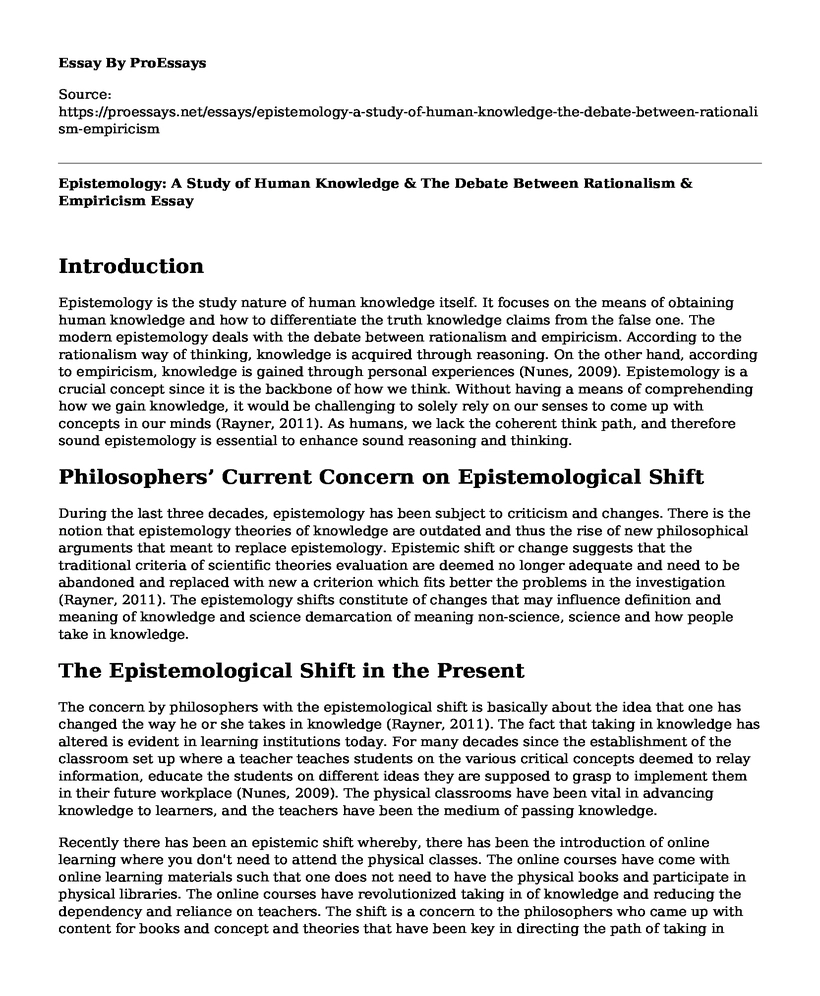Introduction
Epistemology is the study nature of human knowledge itself. It focuses on the means of obtaining human knowledge and how to differentiate the truth knowledge claims from the false one. The modern epistemology deals with the debate between rationalism and empiricism. According to the rationalism way of thinking, knowledge is acquired through reasoning. On the other hand, according to empiricism, knowledge is gained through personal experiences (Nunes, 2009). Epistemology is a crucial concept since it is the backbone of how we think. Without having a means of comprehending how we gain knowledge, it would be challenging to solely rely on our senses to come up with concepts in our minds (Rayner, 2011). As humans, we lack the coherent think path, and therefore sound epistemology is essential to enhance sound reasoning and thinking.
Philosophers’ Current Concern on Epistemological Shift
During the last three decades, epistemology has been subject to criticism and changes. There is the notion that epistemology theories of knowledge are outdated and thus the rise of new philosophical arguments that meant to replace epistemology. Epistemic shift or change suggests that the traditional criteria of scientific theories evaluation are deemed no longer adequate and need to be abandoned and replaced with new a criterion which fits better the problems in the investigation (Rayner, 2011). The epistemology shifts constitute of changes that may influence definition and meaning of knowledge and science demarcation of meaning non-science, science and how people take in knowledge.
The Epistemological Shift in the Present
The concern by philosophers with the epistemological shift is basically about the idea that one has changed the way he or she takes in knowledge (Rayner, 2011). The fact that taking in knowledge has altered is evident in learning institutions today. For many decades since the establishment of the classroom set up where a teacher teaches students on the various critical concepts deemed to relay information, educate the students on different ideas they are supposed to grasp to implement them in their future workplace (Nunes, 2009). The physical classrooms have been vital in advancing knowledge to learners, and the teachers have been the medium of passing knowledge.
Recently there has been an epistemic shift whereby, there has been the introduction of online learning where you don't need to attend the physical classes. The online courses have come with online learning materials such that one does not need to have the physical books and participate in physical libraries. The online courses have revolutionized taking in of knowledge and reducing the dependency and reliance on teachers. The shift is a concern to the philosophers who came up with content for books and concept and theories that have been key in directing the path of taking in knowledge.
Pros and Cons of Epistemological Shift
The pros of the epistemology shifts have led to continued change over the years and in future there its s expected that there will be more significant epistemic shifts. The main pros are; ease of access to knowledge materials online in online classes, libraries and other platforms that can used, stored and even printed. The information can be accessed anywhere and anytime at the convenience of the online user. Most people can access online classes and libraries on their laptops, tablets, and Smartphone which is very convenient compared to the physical courses and libraries (Nunes, 2009).
The cons of the epistemology shift that is a major concern to philosophers are the loss of, reading and communications since the student do not interact physically, these skills be instilled by the teachers and through the help of physical environments. The other con which is a significant concern is that, there is that is not authentic and which may be misleading because the source is not credible. When learners take in such information, they may be misled thinking that they are learning the correct thing. The philosophers are also concern about the issue of duplication of their content because there are many loopholes online to do so.
Conclusion
Change is inevitable in any academic field, with time through research, invention and innovation, new concept, ideas and theories are created that aim at solving the current problems. The philosophers' concerns are genuine but are outweighed by the pros that come with the ongoing epistemology shift in taking in knowledge. Research and technology have made learning enjoyable and convenient since online classes and libraries there is; ease of access of knowledge materials online in online courses, libraries and other platforms that can used, stored and even printed. The information can be accessed anywhere and anytime at the convenience of the online user. Most people can access online classes and libraries on their laptops, tablets, and Smartphone which is very convenient compared to the physical courses and libraries. The philosophers need to embrace the epistemology shift in taking in knowledge and plan on how to use the online platforms.
References
Nunes, J. A. (2009). Rescuing epistemology. RCCS Annual Review. A selection from the Portuguese journal Revista Critica de Ciencias Sociais, (1).
Rayner, S. (2011). Researching style: Epistemology, paradigm shifts and research interest groups. Learning and Individual Differences, 21(3), 255-262.
Cite this page
Epistemology: A Study of Human Knowledge & The Debate Between Rationalism & Empiricism. (2023, Mar 27). Retrieved from https://proessays.net/essays/epistemology-a-study-of-human-knowledge-the-debate-between-rationalism-empiricism
If you are the original author of this essay and no longer wish to have it published on the ProEssays website, please click below to request its removal:
- Course Work Sample - Dialogue Paper: Plato and Skinner
- Global Journalism Ethics Paper Example
- Comparison Between Plato's Allegory to The Truman Show
- In What Ways Is Identity Expressed Through Football Paper Example
- Deontological Ethics: Kant's Perspective on Morality - Essay Sample
- Normative Ethics: Searching for Moral Standards - Free Essay Sample
- Human Factors: Understanding the SHELL Model for Accidents - Essay Sample







